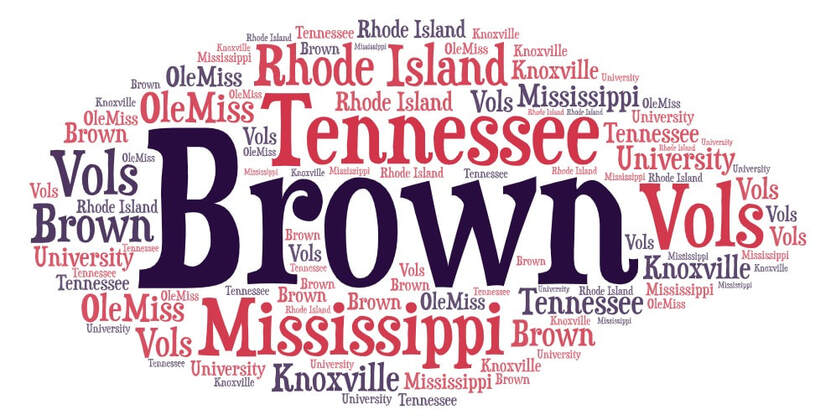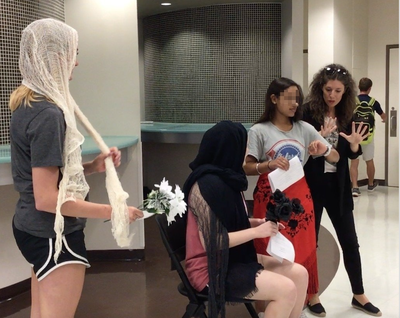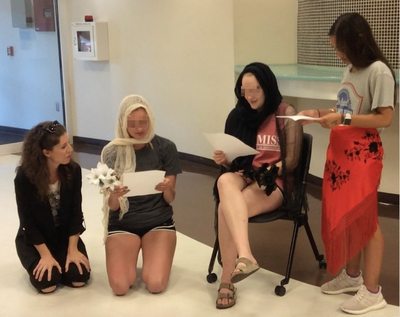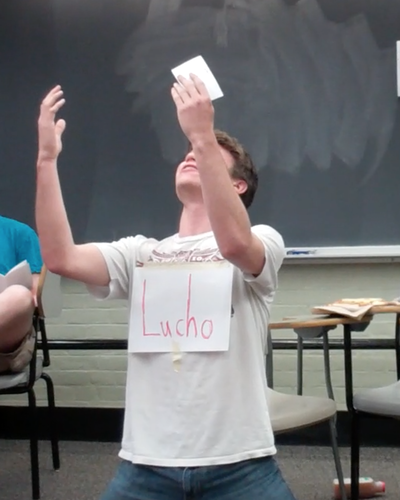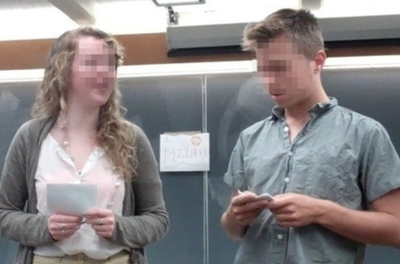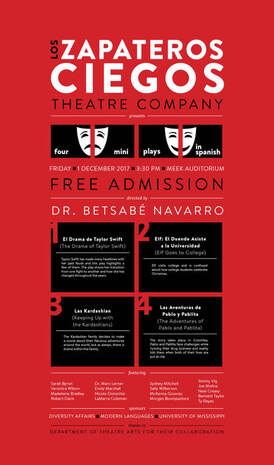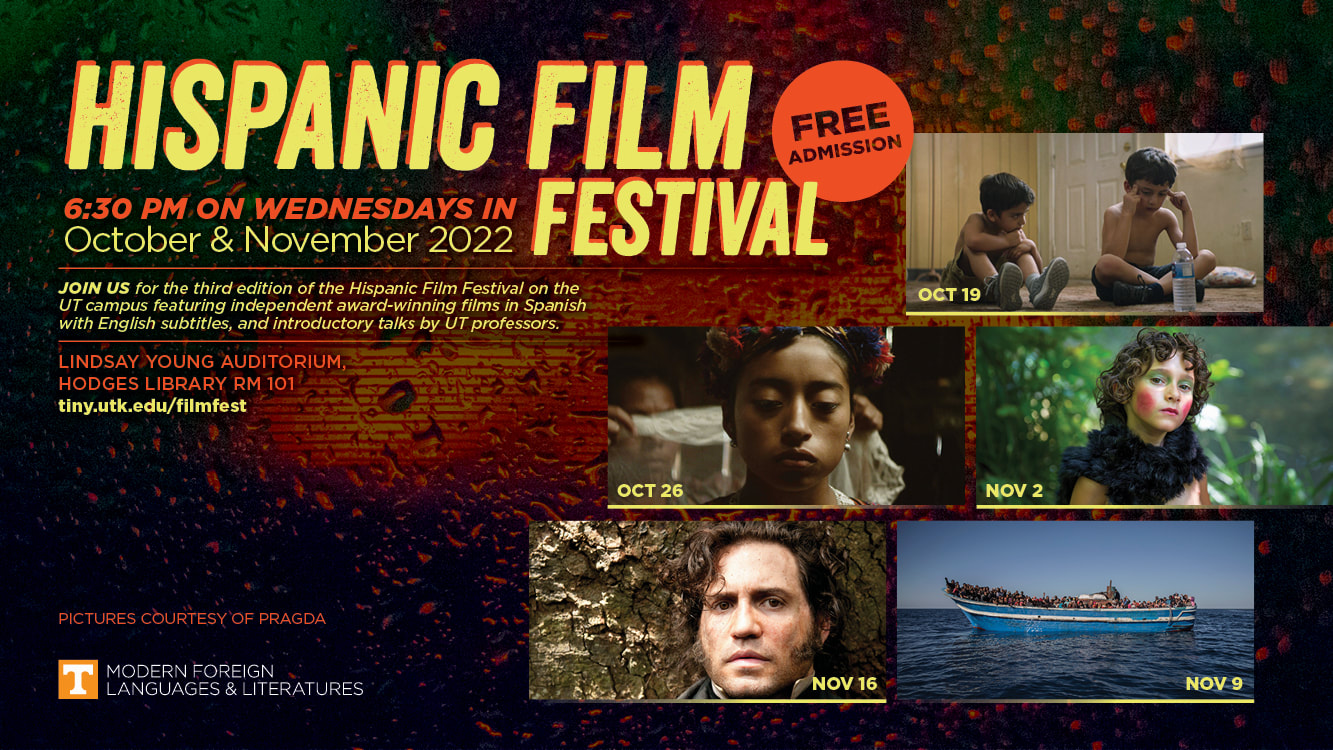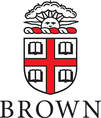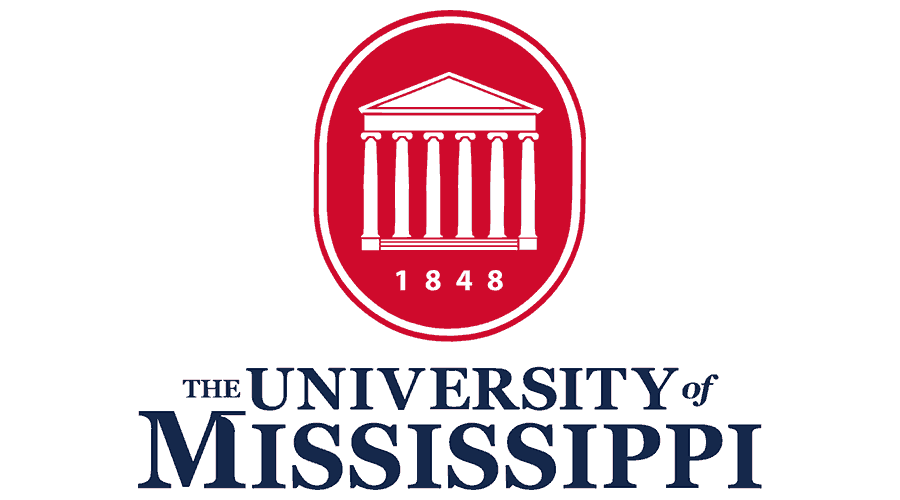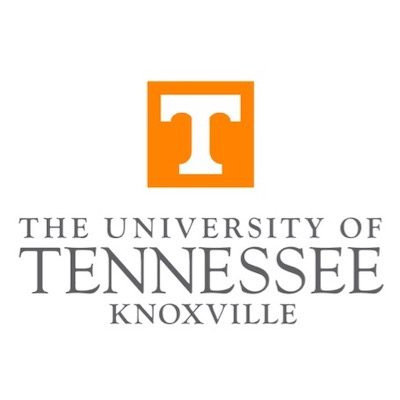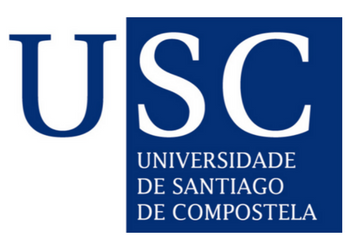Teaching Experience
I am grateful to the institutions mentioned below that have so far enabled me to acquire my teaching experience in diverse contexts. These different experiences have modeled and shaped my teaching behavior, which remains fresh and open to adjustments as my expertise in the field grows. The diversity of students’ backgrounds and levels of ability, as well as the content of those courses that I have taught have allowed me discover my personal skills for teaching. My experience has highlighted the need to be flexible in all those different teaching contexts in which I have taught in the United States, Spain and Britain. My education in didactics of foreign language teaching has successfully prepared me to face teaching from a pedagogical and creative approach with students of different levels and different backgrounds. Similarly, my Ph.D. in Intellectual History and Cultural Studies have also given me the unique opportunity to integrate perspectives of history and culture in content courses of both Spanish and English. In this challenging experience, it was essential to select texts and materials that were to be critically analyzed in my lectures.
Departmental Initiatives
Theatre Production in Spanish |
I have directed a theatre production of four plays in Spanish at the University of Mississippi (Fall 2017, May 2018). Based on my initial experience of dealing with theatre in the classroom at Brown University (Spring 2013), I designed this theatre workshop in the Department of Modern Languages at the University of Mississippi (2017-2018). It consisted of 10 sessions where students could work with drama at many different levels: I designed theatrical activities (body language), a literary workshop (Federico García Lorca's Bodas de Sangre), and a writing workshop (writing a script) concluding in acting rehearsals and a campus-wide final performance that took place at the Meek Auditorium in December 2017 (the University of Mississippi). The production was sponsored by the office of Diversity Affairs (Office of the Provost), the Department of Modern Languages, and the Department of Theatre Arts (the University of Mississippi). This is an example of how to integrate content materials with the so-called experiential learning methodology (Task-Based approach). It was a fun and memorable experience for all.

Hispanic Film Festival
I organized the inaugural and subsequent annual Hispanic Film Festival at the University of Tennessee, Knoxville (2019-present), featuring independent award-winning films in Spanish and other indigenous and national languages of the Hispanic countries (Guarani, Quechua, Aymara, and/or Catalan, Galician, Euskera...). The Hispanic Film Fest sought to enrich the moviegoer experience by presenting filmmakers and UT professors as guest speakers before the screenings. The festival was made possible with the support of Pragda (Spanish Film Club), Spain Arts & Culture, and the Secretary of State for Culture of Spain. The production was thus awarded with a Pragda Grant (SFC) and counted on the sponsorship of eight departments across UT campus: Department of World Languages and Cultures (formerly Modern Foreign Languages and Literatures), Cinema Studies, Department of History, Department of Political Science, Office of Diversity and Engagement, Office of Multicultural Student Life, Center for International Education, and John C. Hodges Library.
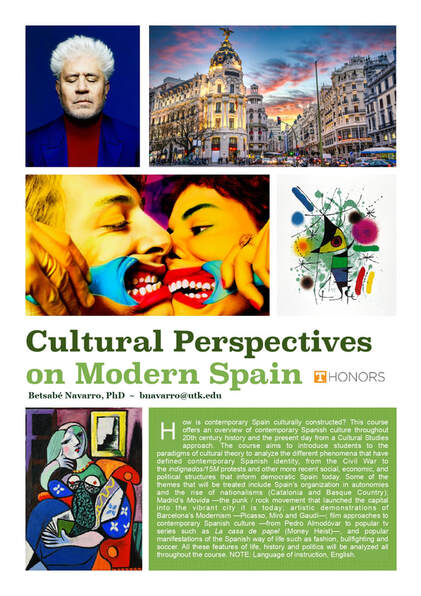
Honors —UNHO277— "Cultural Perspectives on Modern Spain"
The University of Tennessee, Knoxville
How is contemporary Spain culturally constructed? The course aims to introduce students to the paradigms of cultural theory to analyze the different phenomena that have defined contemporary Spanish identity. Some of the themes that will be treated include Spain’s organization in autonomies and the rise of nationalisms (Catalonia and Basque Country); Madrid’s Movida —the punk / rock movement that launched the capital into the vibrant city it is today; artistic demonstrations of Barcelona’s Modernism —Picasso, Miró and Gaudí—; film approaches to contemporary Spanish culture —from Pedro Almodóvar to popular tv series such as La casa de papel (Money Heist)—, and popular manifestations of the Spanish way of life such as fashion, bullfighting and soccer. All these features of life, history and politics will be analyzed all throughout the course.
Promotional video for the UNHO277 class:
Language courses
Brown University (RI)
Department of Hispanic Studies (2012-2013)
The University of Mississippi, Oxford (2015-2018)Department of Modern Languages
The University of Tennessee, Knoxville (2018-present)
|
Online (Asynchronous) Spanish courses
|
Designed Course Syllabi
- Introduction to European Intellectual History (prospective graduate course) Is twenty-first century Western culture an anti-intellectual society? Where have the old intellectuals gone? This course explores the Social History of Intellectuals from the late nineteenth century to present in Europe. The debate on the role of public intellectuals —who can be either opposed to or allied with power— has endured throughout the twentieth century and is now experiencing a particular resurgence in the early twenty-first century.
- Anglo-American Relations: The Special Relationship US/UK (prospective 300 level course). This course offers a historical overview of the “Special Relationship” —as British Prime Minister Winston Churchill named it— between the US and Britain from the end of the Second World War to the present. The aim of this course is to familiarize students with the political and cultural alliance between these two countries, whose relations have focused on three fronts: military cooperation, financial agreements, and cultural ties stemming from shared history, values, and language.
- Theatre through Federico García Lorca: Literary and Cultural Representations of Spain. This is a hybrid language, literature and culture course that focuses on developing upper intermediate students’ linguistic competencies in reading, writing and speaking, as well as fostering their knowledge of Federico García Lorca’s theatre to ultimately understand the deep cultural structures of Spain as represented in the author's literature.
- Cultural Perspectives on Modern Spain. How is contemporary Spain culturally constructed? This course offers an overview of contemporary Spanish culture throughout 20th century history and the present day from a Cultural Studies approach. The course aims to introduce students to the paradigms of cultural theory to analyze the different phenomena that have defined contemporary Spanish identity, from the Civil War to the indignados/15M protests and other more recent social, economic, and political structures that inform democratic Spain today.
English Literature
University of Santiago (Spain) 2010-2012
- English Literature II (Romantic and Victorian Period, 19th century England)
- Other Literatures in English (Postcolonial Irish Short Story)
- Monographic Course of Literature II (Gothic Literature, 19th and 20th century English Literature)
K-12, Perth (Scotland), 2007-2008
Perth Academy and St. Columba’s High School, Perth (Scotland, UK)
• Lower intermediate, Spanish as a Foreign Language
• Upper intermediate, Spanish as a Foreign Language
September 2007 - May 2008
These courses, taught at Secondary Education in the Scottish public education system, were designed with the aim of being an intensive practice of the oral communicative skills – mainly speaking and listening – as the only opportunity students had to be in contact with native speakers and practice the language. Communicative activities were planned in order to elicit the students’ oral production, motivating them, equally, with culture content activities that functioned as prompts to use the language.
• Lower intermediate, Spanish as a Foreign Language
• Upper intermediate, Spanish as a Foreign Language
September 2007 - May 2008
These courses, taught at Secondary Education in the Scottish public education system, were designed with the aim of being an intensive practice of the oral communicative skills – mainly speaking and listening – as the only opportunity students had to be in contact with native speakers and practice the language. Communicative activities were planned in order to elicit the students’ oral production, motivating them, equally, with culture content activities that functioned as prompts to use the language.
